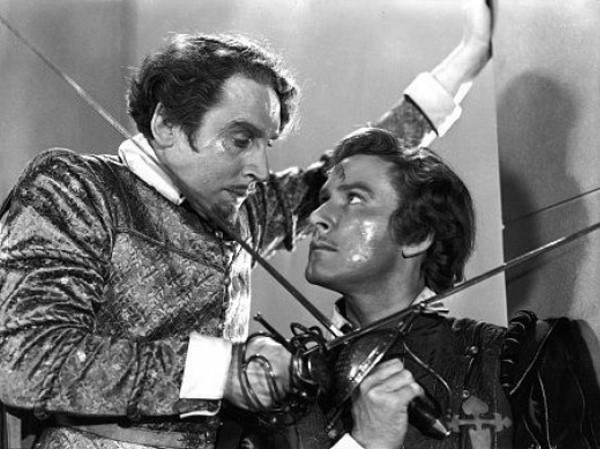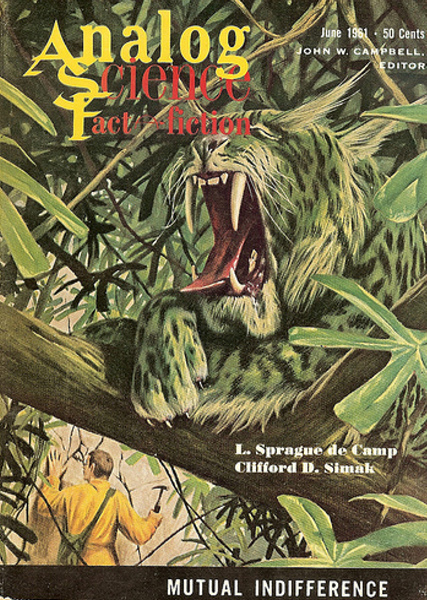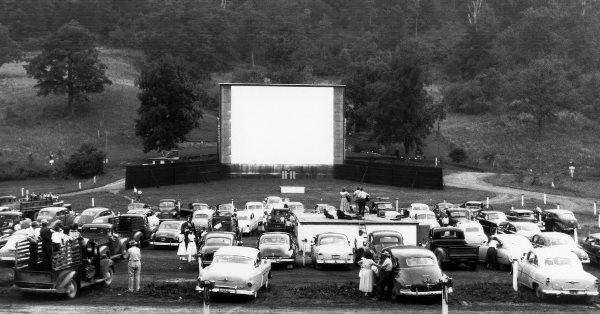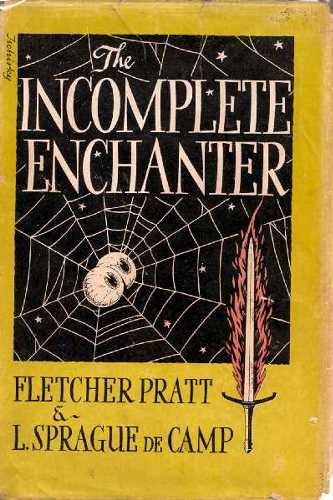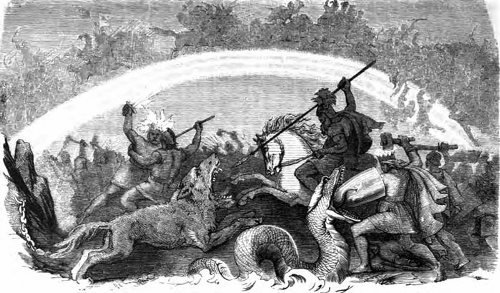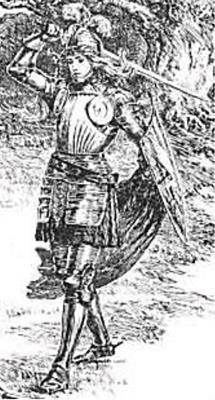
by John Boston
Uh-oh.

The blurb for the lead story in the February 1964 Amazing says: “Once every few years a science fiction story comes along which poses—and probes—philosophical questions: for instance: What is life that Man must live it? In a novel rich in incident, fascinating of character, John Brunner questions the essential meaning of life and death and purpose.”
That’s the pitch for Brunner’s 74-page “complete novel” The Bridge to Azrael. The last time we saw such an editorial panegyric, the mountain labored and brought forth—well, not a mouse. A capybara, maybe. Anyway, a modestly capable pulp-inflected novella, Daniel F. Galouye’s Recovery Area, not exactly the promised philosophical masterpiece for the ages. Sort of the same here, but worse: the mountain has labored and brought forth a mess.
But let’s back up. John Brunner has for years been a mainstay of the British SF magazines, with occasional appearances in the US magazines, growing more frequent in the past couple of years. His most notable contribution has been a series of solid and unpretentious novellas in the UK’s Science Fantasy, some of which have made their way across the Atlantic to become better-than-usual Ace Doubles, like The 100th Millennium and (my favorite) Echo in the Skull—the top of the line at the bottom of the market. So news that Brunner had a novella appearing in Amazing was cause for optimism.
The Bridge to Azrael, by John Brunner

Unfortunately it trips over its pretenses and falls flat. It is proposed that Earthfolk have gone out to the stars in ships and colonized dozens of planets, with which Earth has since lost touch and which have developed over centuries in wildly varying ways. Now, however, Earth has FTL travel via a technology called the Bridge, upon which, if the equipment is properly aligned, one can walk across the light-years. Earth is reopening contact with the the scattered fragments of humanity and trying to bring everyone together by connecting them to the Bridge system. They’re up to 40 worlds.
This process is presided over by Director Jorgen Thorkild, and we are given to understand that he works very hard at his big and (it says here) “fantastically responsible” job. However, when he meets with representatives of one of the next two candidates for Bridging, he realizes that one of them isn’t buying it at all, and he starts to go to pieces. Doesn’t stop, either, and checks into the hospital, overwhelmed with the futility of it all.

Meanwhile, we are introduced to the “programmers.” These are the people charged with scouting and assessing the cultures of the planets to be Bridged, and they are impossibly superior intellectual supermen (if there are women in this clubhouse, they aren’t mentioned). So completely absorbed in their work are they that they can’t stay interested in anything else, like comely members of the opposite sex who adore them, as we learn from the viewpoint of one of the latter. But these hyper-competent intellectual powerhouses are ridden with a paralyzing fear of being wrong. Exactly what will happen if they are wrong is not explained—do they lose their minds? Commit suicide? But the very prospect can impair their judgment and lead them into danger (for one of them, a knife in the chest). Some supermen!
There are plots and subplots here, some of which might be interesting in another context, though the resolution of the reluctant planet problem is irredeemably facile all on its own. But the two whopping implausibilities just recounted make it difficult to take anything here seriously, and undermine any attempt at grand philosophical argument, if there were one of any coherence. So Brunner, whose more modest work sometimes transcends its lack of pretense, has tried something pretentious and fallen on his face. One hopes he takes the lesson. Two stars, generously.
Beside the Golden Door, by Henry Slesar

There is little succor to be found in the short stories. The best of them is Henry Slesar’s Beside the Golden Door, a slightly rambling but reasonably agreeable story about extraterrestrials finding a far-future Earth on which humans have gone extinct, leaving artifacts like the one depicted on the cover (one suspects the story was written around the cover) and records that the aliens are able to decipher quickly. These reveal another story about an earlier wave of aliens who had arrived on Earth seeking refuge after a disaster and were ultimately treated the way humans frequently treat those different from themselves, and there’s an unsurprising revelation at the end that pulls the stories together. Fine conventional sentiments, adequate if slightly hackneyed execution, three stars.
I Bring Fresh Flowers, by Robert F. Young
From here, it’s downhill. Next is I Bring Fresh Flowers, marking the return of Robert F. Young, like a recurring influenza epidemic, though this outbreak is at least milder than some. It’s short, and less of Young is always more. Rosemary Brooks, a beautiful young woman firmly dedicated to God and the United States, becomes an astronaut (or, as Young of course has it, Astronette), and she accomplishes her mission to orientate (sic!) the satellite that will bring genuine weather control to Earth.
But something happens during re-entry. “All that is known is that Rosemary became a falling star.” But not in vain—the weather becomes really fine, all because of her work. “She is the sun coming up in the morning and the sun going down at night. She is the gentle rain against your face in spring.” Et cetera, at some length. In other words, Rosemary has been reincarnated as the pathetic fallacy. Could be worse. Has been, in fact. Two stars.
Heavy, Heavy, by F.A. Javor

Bringing up the rear, or letting it down, is F.A. Javor’s Heavy, Heavy, the tale of a tough guy down on his luck, not as badly written as you might expect, but ending with the revelation of a supposed scientific gimmick so ridiculous as to erase any prior glimmer of merit. One star.
SF Profile: L. Sprague de Camp: Sword and Sorcery, by Sam Moskowitz
Sam Moskowitz coasts through another SF Profile, L. Sprague de Camp: Sword and Sorcery, as usual with better coverage of his pre-World War II material than his later work, omitting to mention his last several SF novels: The Tower of Zanid (1958), its predecessor The Hand of Zei (1950), and The Glory That Was (1960, magazine 1952), plus two out of three of his major 1950s short stories, A Gun for Dinosaur and Aristotle and the Gun. (He does mention the other one, Judgment Day.) The commentary is generally superficial and obvious. Two stars.
Coroner's Report
The cover of this issue, which portrays a deteriorated and morose-looking Statue of Liberty buried up to its armpits, cogently sums up the issue, and, it appears, the state of the magazine generally: sinking out of sight.

![[January 12, 1964] SINKING OUT OF SIGHT (the February 1964 <i>Amazing</i>)](https://galacticjourney.org/wp-content/uploads/2019/01/640112cover-672x372.jpg)




